|
IOWA CITY, Iowa -- The forecast is "clear and cold." There is no sunshine; the predominant colors are the gray of the sky and the dirty-yellowish hue of grass and dead cornstalks. In a few months, Iowa will look so changed, with bright blue skies and decorative white clouds presiding over acres of green. That will be more pleasant. But this is wrestling weather. If you grow up in Iowa, you almost certainly know at least something about wrestling. Like how you don't need to have farmed to be familiar with the crop cycles. It's just part of life around you. 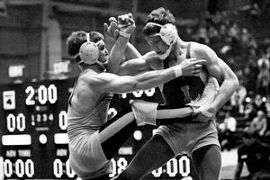 Wrestlers never forget what it's like: Just you and your opponent in a battle of strength, smarts, strategy and sheer stamina. But even those who've never actually wrestled feel it, too, as they pantomime moves while anxiously watching a match. Competitions in many sports are analogized to chess matches. But wrestling is the sport that is closest to truly being a physical version of chess. You go to the mat with a game plan, knowing your preferred moves, aware of the variety of decisions you may need to make. The match might go largely as you intend it to. Or
it may not. In most other sports, your opponents may sense a weakness; in wrestling, they can quite literally feel it. "There are things that are different just because of modern times and technology," wrestling legend Dan Gable said of the advancements that have impacted the ease of scouting, the science of nutrition and dealing with injuries. "But we haven't been able to figure out how to work any less hard, physically." Gable smiles at this, because it's the one thing that never has and never will change about wrestling. "We have to wrestle almost every day. We have to go live more than most sports," he said. "One of the reasons is that it's the only way you can build that kind of conditioning. But also because you really don't learn positions, in reality, except through live skill work. And we're a little old-fashioned, too." This is the heart of why wrestling is so popular in Iowa. "Gable always talked about the rural work ethic, where people roll up their sleeves and get the chores done," said Iowa coach Tom Brands, who wrestled as a Hawkeye for Gable. "Doesn't matter if it's 105 degrees outside or if 20 below zero and the wind's blowing."
There are other states -- Oklahoma, Pennsylvania, Ohio, Michigan and New York among them -- where wrestling has strong and sustaining roots. But none are quite like Iowa. Oklahomans, especially, may argue that and they do have a good case. After all, no school has won more NCAA wrestling titles than Oklahoma State with 34. Rival Oklahoma has seven NCAA crowns. 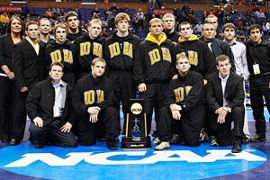 But football is a more successful king in the state of Oklahoma than it's been in Iowa. Oklahoma now even has a franchise from one of the four major professional sports (the NBA's Thunder), while Iowa does not. Ultimately, if you had to pick just one state to which wrestling meant the most, Iowa would be it. "It's the success that people had, along with our climate, our work ethic with farming, the physicality of farm kids -- plus, maybe we had some good genes, too," Gable said of why wrestling took hold as it did in Iowa during the last century. The University of Iowa has won 23 NCAA team titles; Iowa State has eight. Fifty-one Hawkeyes -- including three last year -- have won at least one NCAA individual title. "You can't comprehend the fan base for wrestling in Iowa until you see it," said Hawkeyes senior Luke Lofthouse, who is from Utah but now will always be an "honorary" Iowan. "And it's the whole state -- for little league wrestling to high school to college. "Where I came from we got pretty good crowds, but nothing like what we get here. And the fans know a lot about wrestling, it's not like they are just screaming. They know when to scream." The Hawkeyes have won the last three NCAA titles and are ranked No. 2 in the nation behind Cornell -- the one in New York, not Iowa. Although the Big Red have their Iowa connections, too. (For that matter, Cornell College in Mount Vernon, Iowa, also has quite a wrestling history. It's Division III now, but in 1947 won both the NCAA Division I and AAU national wrestling titles.) Links to the state of Iowa are everywhere throughout wrestling. Just look at the Big Ten, the sport's most powerful conference. Five former Hawkeyes wrestlers are head coaches in the league: Iowa's Brands, Wisconsin's Barry Davis, Illinois' Jim Heffernan, Indiana's Duane Goldman and Ohio State's Tom Ryan. Minnesota coach J Robinson, an Oklahoma State grad, was an assistant to Gable at Iowa from 1976-84, when the Hawkeyes won the NCAA title all but one season. Former Iowa State star and Olympic gold medalist Cael Sanderson, whose 159-0 record is one of collegiate sports' greatest feats, is coach at Penn State. Drew Pariano -- whose Northwestern program is host to the upcoming Big Ten championships -- wrestled for the Wildcats but also has an Iowa link: He previously coached at Cornell College. Competitors from outside the state always recall their first Iowa experience. Kevin Jackson grew up in Michigan, then wrestled at LSU. Before his senior year, the Tigers' program became one of many eliminated in the 1980s and '90s as athletic departments cut back. Wrestling -- perhaps because its greatest popularity was in the Midwest, rather than on either coast or in the South -- far too often felt the ax. Jackson's silver lining was transferring to Iowa State for the 1986-87 season. "It really was like going from the minor leagues to the pros when you looked at how much it was appreciated," said Jackson, now the Cyclones' head coach. "To be able to compete in front of thousands of people in Iowa City and Ames -- it really makes you feel like all the hard work that goes into wrestling is well worth it."
March is time for the Division I collegiate postseason, first with league tournaments and then the NCAA championships in Philadelphia, where Iowa hopes to defend its title. 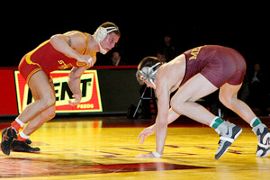 The Iowa prep season -- a tradition that dates back to 1921 -- has just concluded. Love of wrestling in Iowa goes back much further than that, though, to the 1800s. In Waterloo, Iowa, there are two things you must see. The Sullivan Brothers museum chronicles the history of Iowa's heroic war veterans, including the heart-wrenching story of the Sullivan family of Waterloo. All five Sullivan brothers perished together in 1942 when the ship on which they served was sunk during World War II. There was a time when virtually every person in the United States knew the phrase, "Remember the Sullivans." In Iowa, they'll never forget. Also in Waterloo is the National Wrestling Hall of Fame/Dan Gable Museum. There, you can learn about Martin "Farmer" Burns, born in rural Iowa two months before the start of the Civil War and considered the first famous wrestler from the state. He eventually coached the Cedar Rapids Washington High team that won the first state championship. Burns wrote extensively of his training methods; almost all serious wrestlers back then studied Burns' theories, strategies and recommendations. His top pupil became an even bigger national celebrity: a farm boy from Humbolt, Iowa, named Frank Gotch. He was a star in pro wrestling in the days before it became choreographed. The names Burns and Gotch resonate with the same kind of historical weight in Iowa wrestling as, for example, those of James Naismith or Phog Allen do in Kansas basketball. So do the names of the late coach Harold Nichols, the Cresco, Iowa, native who turned Iowa State into a wrestling dynasty, and Bob Siddens of Council Bluffs, Iowa, who coached for three decades at prep powerhouse Waterloo West. Siddens and Nichols were mentors to the biggest name of all: Waterloo native Gable, as compelling an individual as exists in the state's jam-packed wrestling history. Gable -- the two-time NCAA champion, Olympic gold medalist and longtime Hawkeyes coach -- is atop the pantheon of wrestling. Yet he's still readily available anytime a young wrestler needs advice or encouragement. "Someone like Gable, it was like he was a mythical figure," the Hawkeyes' Lofthouse said. "And then you actually meet him
and it's like 'He does exist.' It was cool, but a little intimidating. "Even still, you talk to other wrestlers [outside of Iowa] and say, 'I went and helped coach Gable chop wood,' and they're like, 'Really?' Even right now, I could call him and have an hour-long conversation about wrestling, and it would be normal." There's nothing Gable would rather talk about. "I don't know there's anybody out there that loves the sport more than I do," Gable said.
Gable stepped away from coaching at Iowa in 1997, but his coaching tree goes on and on. Such as with Wisconsin's Davis, a native of Cedar Rapids, Iowa, who won three high school state championships, three NCAA titles for the Hawkeyes, and an Olympic silver medal. "It's the coaching, it's the fan base," Davis said of what makes up the Iowa aura. "The fans here in Iowa will say, 'This is where the NCAA title belongs.'" 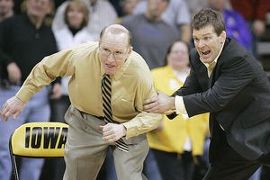 Davis grinned and added, "Now, I'm saying it belongs in Wisconsin." It's truly a reflection of the Hawkeyes' long-term excellence whenever someone who's been affiliated with Iowa moves on to success elsewhere. Gable likes seeing that, because he wants wrestling to flourish nationwide and for various organizations in the sport to work together better. "I'm afraid people look at me and think, 'We don't want him in there when decisions are made, because he's only going to help Iowa,'" Gable said. "I hope there are enough people out there who realize how sincere I am about wanting what's best for wrestling." When Gable stepped away from coaching, one of his goals was to help the sport overall. He first handed the reins of the Iowa program to former Hawkeye Jim Zalesky, one of his assistants. Zalesky won NCAA titles his first three years, but after six more seasons passed without one, he was let go. Brands, who'd also been an assistant at Iowa, was running Virginia Tech's program when he got the call to come home. Tom Brands is one of those classic high-intensity wrestling guys. Understandable, as he is the chief guardian of this flame now -- the Hawkeyes dynasty -- and that is sacred to him. "Fans here expect a lot, but the struggle you sometimes have is with what you put on yourself," Brands said. "For me, it's hard to talk about. I know what I want, and I can never settle for less." Sheer physical superiority usually does prevail in all sports. But there's more of a chance during the length of a wrestling match for perhaps less-gifted athletes to will themselves to win. Brands sees that as another reason why wrestling is so embraced in Iowa. "There is no substitute for toughness; it's the cornerstone of our program and the Gable philosophy," Brands said. "Toughness means being able to embrace the fact that when you walk into that practice room, you need to get things done at 20 times the capacity of a seven-minute match. Because that's what prepares you for that match."
In January, the NWCA/Cliff Keen National Duals meet in Cedar Falls, Iowa, was held at the UNI-Dome, a place big enough to hold the patchwork quilt of 18 wrestling mats, with all collegiate levels competing. Despite the Hawkeyes' absence from the Duals this year, there was still the essence of Iowa wresting. 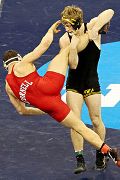 "I love coming back here -- my wrestlers don't understand how I grew up here because it's so cold," said Boise State's Greg Randall, an Iowa native and yet another former Hawkeye who became a college head coach. "They always ask, 'You lived in this, Randall?' I didn't know any better. It doesn't get as cold in Boise, not even close. "I grew up in Mount Vernon, went to school in Iowa City, and my family all comes here to watch us. It's a family reunion for me. And for anybody, anytime you can come to Iowa and wrestle, you better take advantage of it." Wrestlers in Iowa know their history, such as the fact that Iowa State's first Olympic gold medalist was Glen Brand in 1948. Iowa State's current star is senior Jon Reader, who's ranked No. 1 in the nation at 174 pounds. Like his coach, Jackson, Reader is from Michigan and has cherished the chance to wrestle in Iowa. "It's been everything I hoped for and more," Reader said. "I've had the opportunity to wrestle for one of the richest traditions in college wrestling." However, the Cyclones haven't won the NCAA team title since Jackson captained the squad as a senior in 1987. All but one of the NCAA team titles since then have been split between Iowa, Oklahoma State and Minnesota. That one, in 1988, was won by Arizona State, coached by Bobby Douglas, another luminary in wrestling history. "He was a graduate assistant when I was at Iowa State in the '60s," Gable said of Douglas. "He left for a while, but then he came back. Even though he's from Ohio and went to Oklahoma State, he's got a lot of 'Iowa' in him." Indeed, in 1992, Douglas returned to Iowa State as head coach and led the Cyclones to two national runner-up finishes, in 1996 and 2000, before he moved into athletic administration. Sanderson replaced his mentor, Douglas. Then Jackson took over the Iowa State program when Sanderson left in 2009 to coach Penn State. "I want to help Iowa State recapture a national championship," Jackson said. "I was happy at USA Wrestling, but it really was a blessing for me to be able to come back to Iowa State." While the Cyclones want to return to the top of the team podium, No. 1 Cornell hopes to become the first Ivy League team to win the NCAA championship. Cornell and Iowa State finished second and third, respectively, behind Iowa last season. Ithaca, N.Y., is a long way from Cedar Falls, but Cornell coach Rob Koll's father, Bill Koll, is a native of Fort Dodge, Iowa. In the 1940s he won three NCAA titles for Cedar Falls-based Northern Iowa, then known as Iowa State Teachers College. Bill Koll's college wrestling career was interrupted for three years by his service in the Army during World War II; he was a D-Day survivor. His subsequent coaching career included long stays at his alma mater and Penn State. Oh, and his college roommate was
Siddens, the aforementioned Waterloo West coach who trained Gable in high school. You see how many dots there are to connect? Cornell has another Iowa link: senior Justin Kerber, a native of Emmetsburg, Iowa, is an example of the many father-son wrestling connections in the state. Justin's dad, Jeff Kerber, went undefeated throughout his Emmetsburg High career (1976-79) before going on to wrestle for Gable at Iowa. Justin strongly considered becoming a Hawkeye, too, but opted for the Ivy League. Still, he was happy for the chance to wrestle in his home state this winter at the National Duals, where Cornell won the Division I team title. "I'm proud of my roots, that's for sure," Justin said. "I'm proud to be a small-town Iowa kid who takes pride in working hard and being blue-collar. A lot of people point to how many rural communities in Iowa have strong wrestling programs. But there are other parts of the country that are very rural and don't have that same thing that Iowa does. "I don't know exactly what the secret ingredient is, so to speak. But it's a unique thing, and it was great to grow up around it." Gable loves the image of the state of Iowa as a beating heart of wrestling, pumping lifeblood to the sport everywhere. "That means the world to me," Gable said. "I was just a kid with a passion every day of the week, every hour of the day, every minute of the hour. "Those kind of kids are still here; it's a matter of finding those individuals who ooze it. You know, it's not just me. It's in our history." Mechelle Voepel is a columnist for ESPN.com. She can be reached at mvoepel123@yahoo.com. Follow ESPN.com's college sports coverage on Twitter: @ESPN_College and on Facebook.
|
